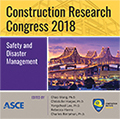Chapter
Mar 29, 2018
Advancing Construction Hazard Recognition through Neuroscience: Measuring Cognitive Response to Hazards Using Functional Near Infrared Spectroscopy
Authors: Mo Hu [email protected], Tripp Shealy [email protected], Matthew Hallowell [email protected], and Dylan Hardison [email protected]Author Affiliations
Publication: Construction Research Congress 2018
Abstract
Robust hazard recognition is critical to reducing the estimated 1,000 fatalities and 230,000 injuries in the U.S. construction industry each year. By adopting methods from neuroscience, this research develops a more accurate method to measure and differentiate cognitive response during hazard recognition tasks. The hypothesis is that the temporal response and cognitive load are influenced by hazard energy source and severity. In a pilot study, engineering students (n = 14) were shown 24 images total in varying (low to high) severity and hazard type (i.e., gradational, mechanical, electrical, and chemical). The results find that the time to peak cognitive activation (i.e., response time) increases as hazard severity decreases. The type of hazardous energy (gravitational, electrical, mechanical, and chemical) also significantly influences the time to peak response. Participants were found to respond more quickly to gravitational hazards while most slowly to chemical hazards. The cognitive energy (i.e., peak or mean cognitive effort) associated with specific regions in the brain such as attention, working memory, topographic memory, and emotional stimuli varied significantly based on hazard type. Most notably, images with severity of gravitational hazards produced a significant increase in activation in the part of the brain associated with topographic memory and motor initiation. Unexpectedly, high severity chemical hazards, were observed to have higher mean activation in the area of the brain associated with unpleasant emotion processing and odor detection. These results serve as a proof of concept that both hazard severity and type are processed using distinctly different regions of the brain. Measuring cognitive demand and localization of brain activation can provide more detailed understanding of the hazard recognition time and neural processing patterns. Future research can begin to test interventions, such as training and mnemonics, to increase hazard recognition response time, attention, and working memory.
Get full access to this article
View all available purchase options and get full access to this chapter.
Information & Authors
Information
Published In
Copyright
© 2018 American Society of Civil Engineers.
History
Published online: Mar 29, 2018
Permissions
Request permissions for this article.
Authors
Affiliations
Graduate Research Assistant, Dept. of Civil and Environmental Engineering, Virginia Tech, Blacksburg, VA 24060. E-mail: [email protected]
Assistant Professor, Dept. of Civil and Environmental Engineering, Virginia Tech, Blacksburg, VA 24060. E-mail: [email protected]
Associate Professor, Dept. of Civil, Environmental, and Architectural Engineering, Univ. of Colorado Boulder, Boulder, CO 80309. E-mail: [email protected]
Graduate Research Assistant, Dept. of Civil, Environmental, and Architectural Engineering, Univ. of Colorado Boulder, Boulder, CO 80309. E-mail: [email protected]
Metrics & Citations
Metrics
Citations
Download citation
If you have the appropriate software installed, you can download article citation data to the citation manager of your choice. Simply select your manager software from the list below and click Download.
Cited by
View Options
Get Access
Access content
Please select your options to get access
Log in/Register
Log in via your institution (Shibboleth)
ASCE Members:
Please log in to see member pricing
Purchase
Save for later Item saved, go to cart Information on ASCE Library Cards
ASCE Library Cards let you download journal articles, proceedings papers, and available book chapters across the entire ASCE Library platform. ASCE Library Cards remain active for 24 months or until all downloads are used. Note: This content will be debited as one download at time of checkout.
Terms of Use: ASCE Library Cards are for individual, personal use only. Reselling, republishing, or forwarding the materials to libraries or reading rooms is prohibited.
Terms of Use: ASCE Library Cards are for individual, personal use only. Reselling, republishing, or forwarding the materials to libraries or reading rooms is prohibited.
Get Access
Access content
Please select your options to get access
Log in/Register
Log in via your institution (Shibboleth)
ASCE Members:
Please log in to see member pricing
Purchase
Save for later Item saved, go to cart Information on ASCE Library Cards
ASCE Library Cards let you download journal articles, proceedings papers, and available book chapters across the entire ASCE Library platform. ASCE Library Cards remain active for 24 months or until all downloads are used. Note: This content will be debited as one download at time of checkout.
Terms of Use: ASCE Library Cards are for individual, personal use only. Reselling, republishing, or forwarding the materials to libraries or reading rooms is prohibited.
Terms of Use: ASCE Library Cards are for individual, personal use only. Reselling, republishing, or forwarding the materials to libraries or reading rooms is prohibited.
